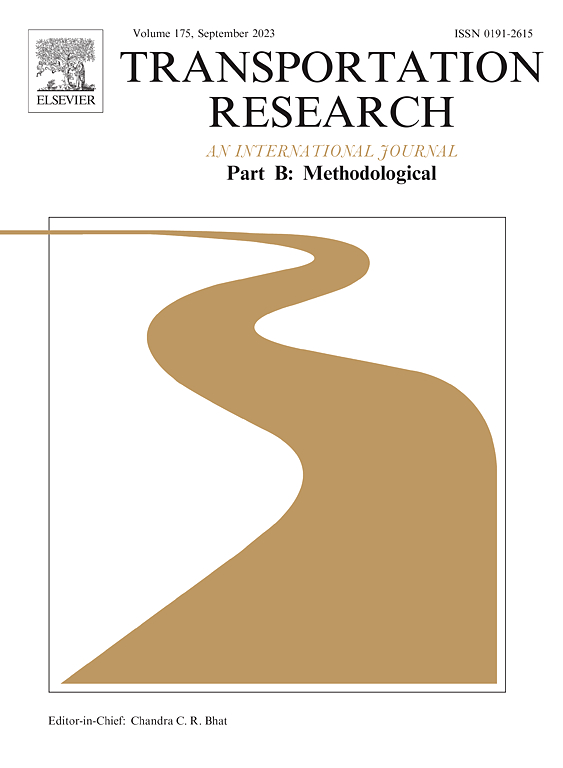To park or to share your autonomous vehicle?
IF 6.3
1区 工程技术
Q1 ECONOMICS
引用次数: 0
Abstract
With the ability to drive autonomously during trips and park themselves, autonomous vehicles (AVs) are anticipated to revolutionize future mobility. How AVs interact with people and transform travel behavior patterns (mobility paradigm shift) is expected to be a “game changer”. This paper investigates an innovative future mobility paradigm where private-AV owners can share their vehicles on a mobility service platform when not in use. We develop tractable models to characterize the travel, parking, and vehicle-sharing choices of AV users, optimize operation strategies of the mobility service platform considering AV sharing, and evaluate their system-wide impacts. In particular, given the operation strategies of the mobility service platform, we formulate the system equilibrium that includes the AV owners’ choice equilibrium and the mobility service market equilibrium. We consider two different business formats for platform operator (namely reselling and commissioning) and three types of AV owners (risk-neutral, risk-averse or risk-seeking). Subject to the system equilibrium, we examine the pricing and fleet sizing strategies of the platform to achieve either profit-maximization or social welfare-maximization. Our analysis explores the impacts of introducing the AV sharing scheme on AV owners, mobility service operator and users, and social welfare. It shows that introducing the AV sharing scheme has the potential to create a win-win-win outcome for AV owners, mobility service operator, and users, with an overall improvement in social welfare. Moreover, both a social welfare-maximizing operator and a profit-maximizing operator may achieve a win-win-win outcome under certain conditions. With risk-averse AV owners, the reselling format proves to be superior to the commissioning format; with risk-seeking AV owners, the commissioning format will outperform the reselling format; while with risk-neutral AV owners, both formats can yield identical platform profit and social welfare. Numerical examples are presented to illustrate the analytical results and provide a deeper understanding of the potential implications of AV sharing.
停车还是共享你的自动驾驶汽车?
由于能够在旅途中自动驾驶和自动停车,自动驾驶汽车(AVs)有望彻底改变未来的出行方式。自动驾驶汽车如何与人互动并改变出行行为模式(移动模式转变)有望成为“游戏规则改变者”。本文研究了一种创新的未来移动模式,即私人自动驾驶汽车车主可以在不使用时在移动服务平台上共享他们的车辆。我们开发了可操作的模型来描述自动驾驶汽车用户的出行、停车和车辆共享选择,优化考虑自动驾驶汽车共享的出行服务平台的运营策略,并评估其对系统的影响。特别是考虑到出行服务平台的运营策略,我们构建了包含自动驾驶汽车车主选择均衡和出行服务市场均衡的系统均衡。我们考虑了平台运营商的两种不同业务模式(即转售和调试)和三种类型的AV所有者(风险中性、风险厌恶或风险寻求)。在系统均衡的前提下,我们研究了平台的定价和车队规模策略,以实现利润最大化或社会福利最大化。我们的分析探讨了引入自动驾驶汽车共享计划对自动驾驶汽车车主、移动服务运营商和用户以及社会福利的影响。研究显示,引入自动驾驶汽车共享计划,可为自动驾驶汽车车主、移动服务营运商和使用者创造三赢的结果,并整体改善社会福利。而且,在一定条件下,社会福利最大化的经营者和利润最大化的经营者都可能实现三赢。对于风险厌恶的AV所有者,转售格式被证明优于委托格式;对于喜欢冒险的影音车主,委托模式的表现将优于转售模式;而对于风险中性的自动驾驶车主,两种模式都可以产生相同的平台利润和社会福利。文中给出了数值例子来说明分析结果,并对AV共享的潜在影响提供了更深入的理解。
本文章由计算机程序翻译,如有差异,请以英文原文为准。
求助全文
约1分钟内获得全文
求助全文
来源期刊
CiteScore
12.40
自引率
8.80%
发文量
143
审稿时长
14.1 weeks
期刊介绍:
Transportation Research: Part B publishes papers on all methodological aspects of the subject, particularly those that require mathematical analysis. The general theme of the journal is the development and solution of problems that are adequately motivated to deal with important aspects of the design and/or analysis of transportation systems. Areas covered include: traffic flow; design and analysis of transportation networks; control and scheduling; optimization; queuing theory; logistics; supply chains; development and application of statistical, econometric and mathematical models to address transportation problems; cost models; pricing and/or investment; traveler or shipper behavior; cost-benefit methodologies.

 求助内容:
求助内容: 应助结果提醒方式:
应助结果提醒方式:


